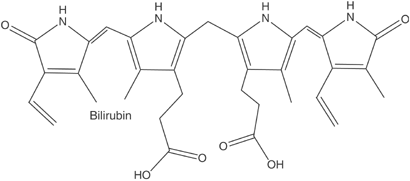bilirubin

Bilirubin is a green-orange pigment derived from blood. Bilirubin is produced in the breakdown of hemoglobin when erythrocytes (red blood cells) have reached the end of their useful lives. It is carried by plasma to the liver, where it is extracted by hepatic parenchymal cells. It is then conjugated with glucoronide molecules to form bilirubin glucoronide, and excreted in the bile. Bilirubin imparts to bile its greenish-yellow color.
Bile is stored in the gall bladder and aids in the digestion of dietary fat. Much of the dark color of feces is the result of bile pigments, including bilirubin.
Bilirubin and jaundice
Various forms of jaundice result from an excess of bilirubin in the blood. Hemolytic jaundice occurs when the rapid breakdown of too many red blood cells results in the overproduction of bilirubin. This may occur in such diseases as malaria, sickle-cell anemia, and sepsis.
Hepatocellular jaundice occurs when damage to the liver lessens its ability to remove bilirubin from the blood. This happens commonly in hepatitis, cirrhosis of the liver, and liver cancer.
Physiologic jaundice sometimes occurs when newborn babies have too much bilirubin in the blood. This form of jaundice usually disappears within a few days as the infant's liver matures in its ability to handle bilirubin.


